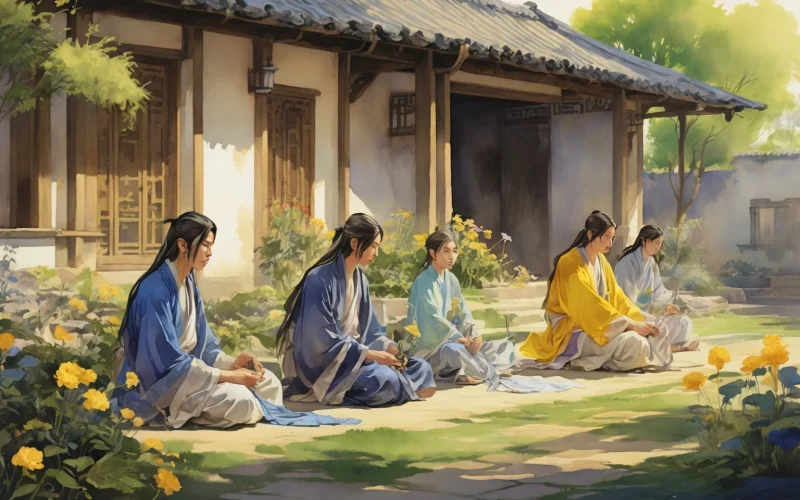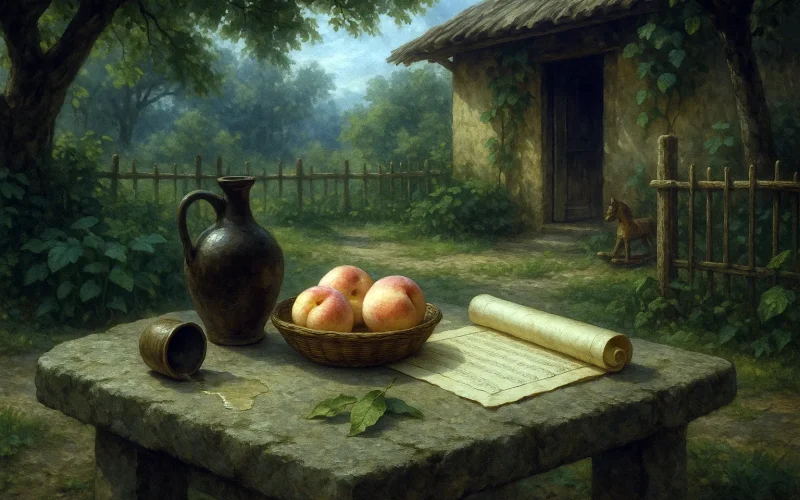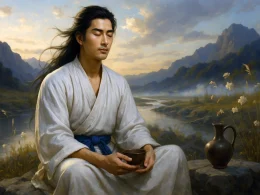My temples covered with white hair,
My skin wrinkled, my muscles slack.
Though I have five sons, none would care
To read or write in white or black.
My eldest son is now twice eight,
But lazy as him none appears.
My second son won't dedicate
Himself to arts at fifteen years.
My third and fourth sons at thirteen
Know not how much makes six plus seven.
My youngest son has nine years green;
'Mid pears and nuts he is in heaven.
If such be the decree divine,
What can I do but drink my wine?
Original Poem
「责子」
陶渊明
白发被两鬓,肌肤不复实。
虽有五男儿,总不好纸笔。
阿舒已二八,懒惰故无匹。
阿宣行志学,而不爱文术。
雍端年十三,不识六与七。
通子垂九龄,但觅梨与栗。
天运苟如此,且进杯中物。
Interpretation
This poem was composed around 408 AD when Tao Yuanming was forty-four years old, living in retirement at home. Having passed the age of forty with prematurely graying hair and declining health, while watching his sons grow up, the poet ostensibly chides his children for laziness but actually expresses a complex mixture of resignation, humor, and paternal affection. Historical interpretations vary: Du Fu read stern criticism in these lines, while Huang Tingjian emphasized the absence of genuine reproach, seeing instead self-deprecating amusement. A closer reading reveals that despite abandoning official life for reclusion, Tao still cherished hopes for his children's success. Through this interweaving of self-mockery and wit, he captures that uniquely parental blend of helplessness and profound love when watching one's offspring neglect their studies.
First Stanza: "白发被两鬓,肌肤不复实。"
Bái fà bèi liǎng bìn, jīfū bù fù shí.
"My temples now are veiled in white,
My flesh no longer firm and tight."
The poet begins by describing his own aging physique, setting the stage for expressing paternal concerns.
Second Stanza: "虽有五男儿,总不好纸笔。"
Suī yǒu wǔ nán'ér, zǒng bù hào zhǐ bǐ.
"Though five sons call me father dear,
None shows the scholar's bent sincere."
Here surfaces his disappointment and resignation regarding his children's academic indifference.
Third Stanza: "阿舒已二八,懒惰故无匹。"
Ā Shū yǐ èr bā, lǎnduò gù wú pǐ.
"A-Shu at sixteen years of age
Outdoes all peers in sloth's engage."
With humorous reproach, he singles out his eldest son's exceptional laziness.
Fourth Stanza: "阿宣行志学,而不爱文术。"
Ā Xuān xíng zhì xué, ér bù ài wén shù.
"A-Xuan at learning's proper stage
Still shuns the scholar's noble page."
Continuing his gentle critique, he notes the second son's disinterest in literary pursuits.
Fifth Stanza: "雍端年十三,不识六与七。"
Yōng Duān nián shísān, bù shí liù yǔ qī.
"Yong-Duan, thirteen years complete,
Cannot tell six from seven neat."
With playful exaggeration, he describes the third son's academic neglect, blending seriousness with jest.
Sixth Stanza: "通子垂九龄,但觅梨与栗。"
Tōng zǐ chuí jiǔ líng, dàn mì lí yǔ lì.
"Tong approaches nine years old,
Seeking pears and chestnuts bold."
The fourth son's childish preoccupation with snacks adds both charm and parental vexation.
Seventh Stanza: "天运苟如此,且进杯中物。"
Tiān yùn gǒu rú cǐ, qiě jìn bēi zhōng wù.
"Since Heaven wills it should be so,
Let this cup's content freely flow."
The conclusion strikes a note of philosophical acceptance, embodying his yielding to nature's way.
Holistic Appreciation
"Chiding My Sons" superficially criticizes but fundamentally conveys Tao Yuanming's earnest educational hopes and resigned affection. With lighthearted wit, he catalogs his five sons' scholarly indolence - the dissatisfaction in his tone always tempered by smiling tolerance. Exaggerations like "cannot tell six from seven" comically portray childish neglect, rendering the poem amusing rather than severe. The concluding turn to wine ("Let this cup's content freely flow") shows self-comforting acceptance, revealing a father who maintains expectations yet ultimately embraces nature's course with transcendent ease. Sincere in emotion and artless in expression, the poem radiates human warmth and worldly wisdom.
Artistic Merits
The poem's language remains unadorned yet profound, its humor concealing deep meaning. Through skillful hyperbole and parallel structure, Tao criticizes his children's study habits while revealing paternal devotion. The verses flow with natural spontaneity, blending domestic authenticity with folk-song freshness - hallmark of Tao's "plain and natural" aesthetic. The wine conclusion particularly connects personal fate with cosmic order, epitomizing his philosophy of yielding to heaven's will while finding joy in humble circumstances.
Insights
This work reminds us that while parents naturally desire their children's success, life's paths vary. Beyond instruction and expectation lies the need for acceptance and broad-mindedness. Tao's serene humor teaches us to meet life's disappointments without harsh judgment, preserving inner peace through detached magnanimity. The poem ultimately transcends parental guidance to become wisdom for harmonious living.
Poem translator
Xu Yuanchong (许渊冲)
About the poet

Tao Yuanming(陶渊明), 365 – 427 CE, was a poet, literary figure, fu writer, and essayist active during the late Eastern Jin and early Liu Song dynasties. Born in Chaisang (near present-day Jiujiang, Jiangxi Province), he pioneered a new genre of pastoral-themed literature, expressing profound philosophical insights through simple language. His poetic style became an enduring aesthetic standard in classical Chinese poetry.












